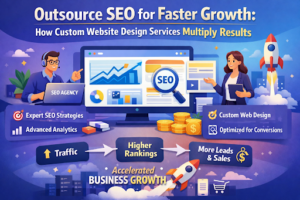Cloud computing has been emerging as a transformative technology, reshaping enterprise applications. As businesses increasingly rely on digital solutions to drive their operations, the scalability, flexibility, and cost-efficiency offered by cloud computing services make it the future of enterprise apps in 2023 and beyond.
There is an increasing demand for modern enterprise applications due to the need for companies to streamline their operations and enhance their client experiences to have a competitive advantage.
Cloud computing services have become the ultimate choice for many organizations due to their numerous benefits. Here, we will be exploring why cloud computing is the future of enterprise apps in 2023, how it works, and its importance, etc.
How do cloud computing services work?
Cloud computing enables the internet to deliver access to computing resources easily, such as storage, processing power, databases, and other services. Cloud computing providers, such as Amazon Web Services (AWS), host resources in data centers that are managed by them and are accessible to businesses through the internet.
The process of cloud computing involves several key components:
Cloud Infrastructure
Cloud computing services offer the ability to operate and handle an extensive network of data centers that make the physical infrastructure, such as servers, networking equipment, storage devices, etc.
Virtualization
The resources in the data centers are virtualized, which means they are abstracted from the physical hardware and presented as virtual instances to users. This allows businesses to provision and manage resources as needed, without being tied to specific physical hardware.
Resource Allocation
Businesses can request and allocate computing resources from the cloud computing provider’s pool of virtualized resources based on their requirements. This involves computing power, memory, storage, and other resources which are essential to operate their apps and services.
Scalability
Cloud computing helps for easy scalability, where organizations are rapidly adding or removing resources depending on their requirements. This allows businesses to handle varying workloads and accommodate peak times without disruptions.
Pay-as-you-go Pricing
Now, organizations are using a pay-as-you-go pricing model, where they pay only for the resources used by them. This means that businesses do not need to make upfront investments in hardware or infrastructure, but instead can scale their resource usage up or down as needed, and only pay for what they consume.
Application Deployment
Organizations can deploy their applications in the cloud, depending on their location or the device they are using, if they have an internet connection. This level of flexibility and accessibility provided by cloud computing allows businesses to cater to the needs of a mobile and distributed workforce and enables seamless collaboration and productivity across different locations and devices.
Management and Monitoring
Cloud computing services offer services and tools for organizations to operate and control their apps and resources. This involves controlling security, monitoring performance, and handling updates and patches.
Compliance
Cloud computing businesses adhere to several industry standards and laws, guaranteeing enterprises’ data security, privacy, and legal compliance.
Why is Cloud Computing Important?
Before the emergence of cloud computing, businesses had to maintain all of their software and information on servers and hard drives. The demand for storage developed as the company expanded. This way of handling data is unable to expand quickly. As an illustration, if word of your company spread and you immediately collected an enormous amount of online orders, the servers probably would crash.
The cloud has changed our lives as human beings as well. Most of us use cloud services daily. Whenever we put our story on social media, watch a new streaming series, or check our bank statements, the majority of the programs we use are presumably hosted by cloud services. These applications are accessible via the internet rather than downloaded on our devices.
With today’s cloud technology, businesses can scale and react quickly, encourage business agility, accelerate innovation, update operations, and cut costs. This can not only aid companies get through the present crisis, but it may also end in more robust, long-term growth.
Prediction of cloud computing
The future of cloud computing is bright, with Amazon Web Services leading the way as a leading cloud computing solution. As technology continues to advance, cloud computing is predicted to revolutionize the way businesses operate to drive innovation and efficiency. Here are some potential predictions for cloud computing in 2023:
Continued Growth
Cloud computing is expected to experience significant growth in 2023, with more businesses and organizations adopting cloud-based solutions for their IT infrastructure, applications, and data storage needs. The demand for cloud services is likely to continue to rise as businesses strive to optimize operations, enhance agility, and leverage advanced technologies.
IoT Integration and Edge Computing
In 2023, edge computing—which includes processing data more closely to its generation—is anticipated to pick up steam. Cloud computing solutions enable real-time processing and analysis of data at the edge of the network, particularly for applications related to the Internet of Things (IoT) and other latency-sensitive use cases.
Advanced Analytics and AI-powered Solutions
Cloud computing is anticipated to further integrate advanced analytics and AI-powered solutions in 2023. Machine learning, natural language processing, computer vision, and other AI technologies may be integrated into cloud services, enabling businesses to gain insights from their data, automate processes, and enhance decision-making.
Focus on Sustainability
As environmental concerns gain more attention, cloud computing solutions may put a greater emphasis on sustainability in 2023. This may include initiatives such as using renewable energy sources, optimizing data center efficiency, and promoting environmentally responsible practices in their operations.
These predictions are subject to vary based on several factors like regulatory changes, technological advancements, and market dynamics. So it is highly recommended to consult with industry experts and stay updated with the recent developments in cloud computing for more precise predictions.
Enterprise Solutions With Cloud
Enterprise cloud computing offers businesses new opportunities to lower costs while improving business flexibility and network security. Scalable and adaptable access to computing resources, such as processing power, computer memory, and data storage, becomes essential when companies experience digital transformation. These businesses were accustomed to spending a lot of money on their own networks and data centers and maintaining them. However, because of collaborations with public and private enterprise cloud service providers, they can now utilize these resources at affordable prices.
Alongside providing computer resources employing the Internet, enterprise cloud service providers can additionally provide managed services or software cloud management systems to help their clients in optimizing all the benefits of utilizing enterprise cloud technology.
Why are Enterprises Moving to the Cloud?
According to a 2019 survey of technical specialists from different firms, enterprise cloud technology has recently experienced tremendous adoption, with anticipated adoption rates of 91% for public cloud solutions and 72% for private cloud services.
Several factors drive organizations to quickly adopt enterprise cloud technology:
Cost savings
Adopting an enterprise cloud solution often allows businesses to leverage pay-as-you-go pricing, meaning they only pay for the resources they use. This eliminates the need for upfront costs associated with building and maintaining in-house computing infrastructure, such as data centers and servers. As a consequence, enterprise cloud users frequently notice lower, less unpredictable, and easier IT costs.
Security
Enterprises are frequently targeted by cyber threats aiming to steal or expose data, which can be costly to remedy and damage a company’s reputation. Enterprise cloud technology offers access to robust security applications. In both sectors whether private or public deployment, Cloud service supports data security.
Innovation and Flexibility
Enterprise cloud computing provides organizations the liberty to change the scale of their resource consumption upward or downward whenever needed, helping them to introduce the latest products or check recent services with less upfront capital costs. This eliminates obstacles to innovation and enables organizations to rapidly adjust to shifting organization requirements.
Future of cloud computing: AI-powered, hybrid, and edge technologies
Cloud computing has undergone significant changes, evolving from hybrid to edge to AI-powered solutions, reshaping the way businesses operate and leverage technology in today’s digital landscape.
Cloud computing solutions have transitioned from the traditional model of a hybrid approach, which combines on-premises and cloud-based resources, to enable businesses to optimize their operations and reduce IT complexity. This enables businesses to take advantage of both on-premises and cloud environments, making their infrastructure meet their distinct needs and requirements.
Moreover, cloud computing solutions are constantly changing with the addition of machine learning. AI-powered cloud services enable businesses to harness the power of data and derive actionable insights, automate processes, and enhance customer experiences. For example, businesses can leverage AI-powered analytics to gain insights from large datasets, automate repetitive tasks, and improve decision-making through predictive analytics.
Conclusion
Cloud computing is set to be the future of enterprise apps in 2023 and beyond, offering unprecedented scalability, flexibility, and innovation opportunities for businesses. Cloud computing services are now equipped with advanced security features such as strong encryption, access controls, and threat detection, to safeguard valuable business data from unauthorized access and cyber threats. This added layer of security enables enterprises to harness the full potential of the cloud to drive business success and maintain a competitive edge in the digital era.
Original source: here











